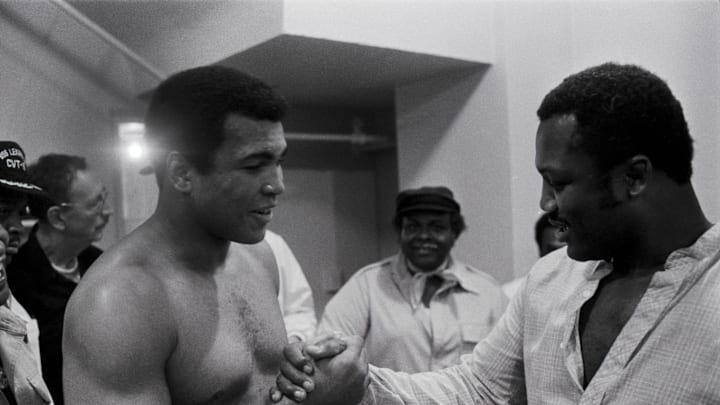2. Evander Holyfield vs. Riddick Bowe
The 1990s, much like the 70s, is often regarded as a golden age for heavyweight boxing. At the same time, names like Lennox Lewis and Mike Tyson dominated much of the headlines; Evander Holyfield provided the action inside the ring.
After conquering the cruiserweight division in the late 1980s, Holyfield moved to the heavyweight division in search of the sport's most coveted prize. After six fights, including wins over contenders Michael Dokes and Alex Stewart, he put himself in position for a shot at the heavyweight title.
James "Buster" Douglas foiled plans of a mega fight between Holyfield and Tyson by scoring one of the biggest upsets in boxing history when he stopped the famous knockout artist in Japan in February 1990. Holyfield would quickly dispatch Douglas in three rounds to gain the heavyweight crown.
No matter how entertaining he was in the ring, acclaim and acceptance from the public wouldn't come to Holyfield. He was certainly popular but wasn't provided the recognition and respect that usually is attributed to holding the heavyweight championship. That is until he met Riddick Bowe in 1992.
Bowe was a 6'5 Olympic silver medalist whom the legendary Eddie Futch trained. It wasn't until his fights with Bowe that Holyfield would find the notoriety that had alluded him.
The first fight in November 1992 is arguably the best heavyweight match of the decade, with the 10th round being one of the best in the division's history. Holyfield would lose by decision, but the heart and grit to respond even when being pummelled by Bowe endeared him to the public.
In a rematch, one year later, that is primarily remembered for the bizarre fan-man incident. In the seventh round, a man on a motorized paraglider landed on the ring ropes. The action was halted until the commotion was alleviated, taking over 20 minutes for the fight to resume.
For the second match with Bowe, Holyfield would train under Emanuel Steward. He utilized more of a strategic game plan of picking and choosing when to attack.
The change in strategy proved successful, as Holyfield would win a majority decision.
Following the win over Bowe, Holyfield lost his heavyweight title to Michael Moorer and then retired due to a heart condition. Months later, he would return, claiming to be cured, thus setting up the trilogy match with Bowe for November 1995.
For the first time in his career and in their series of fights, Holyfield would knock down his rival in the sixth round with a left hook. Bowe would respond by knocking Holyfield down twice in the eighth round. Holyfield was stopped for the first time in his career.
The third fight would be the final moment of glory for Bowe. After Holyfield, he had two infamous fights with Andrew Golota that ended in disqualification due to low blows. One of which resulted in a riot at Madison Square Garden.
Holyfield would continue fighting at the championship level for years to come. His last fight wouldn't be until 2011.
The Holyfield-Bowe series was one of the highlights of the 1990s. It showed, especially for Holyfield, how one can obtain respect even when they are at their most vulnerable.
